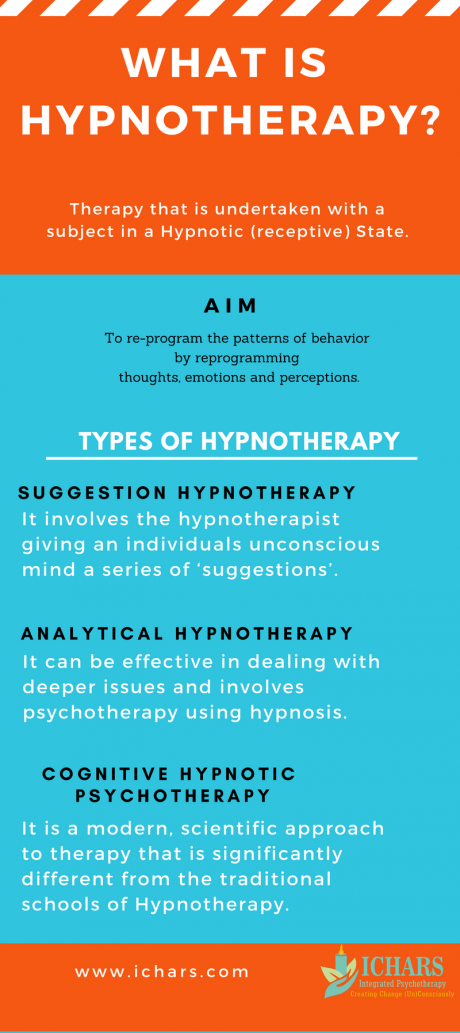One of the most common applications of Hypnosis is in the field of change work. One can use Hypnosis in combination with different Coaching Models and Therapeutic approaches to help clients achieve their goals and overcome intense emotional issues more naturally, effectively and sustainably.
The application of hypnosis in therapy is popularly known as Hypnotherapy whereas its application in Coaching is now referred to as Hypnotic Coaching.
If you are wondering what is the difference between coaching and therapy, you can refer to the video titled “Coaching versus Therapy” on ICHARS Youtube channel.
In this post, we are going to focus on answering all your questions about what, why and how of the application of Hypnosis in therapy. If you are a coach, you may also be interested in exploring why to use Hypnosis in combination with Coaching.
While exploring the answer to the question what is hypnotherapy, it is important to understand that the word Hypnotherapy is a bit of a misnomer. It creates an impression that Hypnotherapy is a complete approach to therapy that is independent of other approaches. This isn’t really true. Moreover, this understanding simply limits all that can be done by integrating Hypnosis with other fields of therapy.
These therapeutic modalities include but are not limited to Cognitive therapy, Behavioural Therapy, Humanistic Approaches or even Psychodynamic.
In fact, the true power of Hypnosis in therapy can be actualized by using it as a base to seamlessly integrate different approaches to therapy thereby creating a truly eclectic approach.
What is Hypnotherapy?
Hypnosis is defined as a state of hyper-suggestibility where a person is more receptive and open to accepting suggestions.
Psychotherapy is the use of psychological methods to help a person change behaviour, increase happiness, and overcome problems by identifying and addressing the underlying thoughts, emotions, beliefs, values, positive intentions, suppressed emotions or repressed memories.
Hypnotherapy is defined as the therapeutic application of hypnosis.
This means when a trained psychotherapist uses any therapeutic technique in combination with hypnosis to help a client or patient overcome mental, emotional or physical challenges, it is called hypnotherapy.
And the therapist is called a Hypnotherapist.
Frequently Asked Questions about Hypnotherapy
Are Hypnotherapy and Psychology related in any way?

This is one of the most common questions people ask while exploring what is hypnotherapy. To answer this question, let us understand the words Hypnosis, therapy and psychology.
Hypnosis is all about helping a person’s mind become more receptive to suggestions.
Therapy is all about helping people create a change in their thoughts, emotions, behaviours, beliefs and perceptions.
Since psychology is defined as the scientific study of the human mind and its functions, hypnotherapy and psychology are intrinsically connected to each other.
Why use Psychotherapy or Counselling in combination with Hypnosis?
The subconscious mind controls all automatic processes of the mind: be it thoughts, emotions or behaviours and it is also the storehouse of all our past experiences, suppressed emotions and beliefs. Any process that can help the psychotherapist access and influence these thoughts, emotions, behaviours, beliefs and past experiences are priceless from the point of view of therapy or counselling.
Since Hypnosis is a state where the subconscious is very receptive to suggestions, it becomes the most natural state to create therapeutic change.
It is for this reason that hypnotherapy can help people create changes even in automatic thoughts and behaviours that other talk-based psychotherapies may face difficulty with.
In fact, there are already many therapeutic techniques and change processes that extensively use hypnosis (knowingly or unknowingly).
Although their advocates argue otherwise, when they get a deeper understanding of what is Hypnotherapy, they also begin to realise the same. Here are a few of these practices that are basically hypnotic:
- Creative Visualization
- Guided Imagery
- Guided Meditations
- Flooding
- Systematic Desensitization
- Emotional Freedom Technique or EFT
- Eye Movement and Desensitization and Re-Processing or EMDR
What role Hypnosis plays in Eclectic Psychotherapy?
Most psychologists begin their practice by following theories and techniques from one school of psychotherapy. Some therapists only practice Psychoanalysis while others practice cognitive therapy and some others may practice behavioural therapy to name a few.
Each school has its own advantages and its own limitations. Over a period of time, the psychotherapist starts understanding these limitations and hence starts looking at ways to incorporate theories and techniques from other schools into their current practice.
When a psychologist integrates theories and techniques from two or more schools of psychotherapy, they are said to practice Eclectic Psychotherapy.
The biggest challenge that most psychologists and counsellors face when trying to integrate the different schools of psychotherapy is that at times the theories and presuppositions of each school may come across as very different from other schools.
In the absence of a model that can act as a thread between these apparently different theories, most of the so-called eclectic psychotherapists are only able to combine parts of these different schools of psychotherapies.
This is where hypnosis can play an extremely important role. Once you start understanding what hypnosis really is, it can literally act as a thread that can help integrate these different schools of psychotherapies into a comprehensive eclectic approach.
Our Cognitive Hypnotic Psychotherapy® course is an extremely good example of how all the major approaches to psychotherapies can be integrated into a comprehensive approach to psychotherapy.
If you want to explore in detail how this integration works and read case studies on the same, check out the What is Cognitive Hypnotic Psychotherapy post.
Does Hypnotherapy really work? Are there researches available on the effectiveness of Hypnotherapy?
“Research shows that (Hypnosis) is a very powerful means of changing the way we use our minds to control perception and our bodies,” says the study’s senior author, David Spiegel, MD, professor and associate chair of psychiatry and behavioural sciences.
Hypnotherapy sessions have been shown to be effective in –
- Lessening chronic pain and the pain of childbirth and other medical procedures.
- Treating smoking addiction and post-traumatic stress disorder.
- Easing anxiety or phobias.
Let us quickly look at some of these researches that illustrate the effectiveness of hypnotherapy.
- Post-Surgical Pain
A comprehensive review of studies of the effectiveness of hypnosis for reducing procedure-related pain in children and adolescents shows that hypnosis was consistently found to be more effective than control conditions in alleviating discomfort associated with bone marrow aspirations, lumbar punctures, voiding cystourethrogram, the Nuss procedure, and post-surgical pain.
A randomized trial on the use of hypnotic analgesia for invasive medical procedures showed hypnosis to have pronounced effects on pain and anxiety reduction, and in improving hemodynamic stability.
- Chronic Pain
Hypnosis is regarded as an effective treatment for psychological and physical ailments. A study to conduct a meta-analysis to assess the efficacy of hypnosis for managing chronic pain suggests that hypnosis is efficacious for managing chronic pain.
The reviews of controlled prospective trials of hypnosis for the treatment of chronic pain indicate that hypnosis consistently and significantly lessened pain in a variety of chronic-pain problems. It is important to note that hypnosis was generally found to be more effective than non-hypnotic interventions such as attention, physical therapy, and education!
Stress and Anxiety-Related Disorders
In a review of the literature on the use of self-hypnosis in the treatment of anxiety and stress-related disorders, self-hypnosis was shown to be a rapid, cost-effective, non-addictive, safe alternative to medication for the treatment of anxiety-related conditions, such as:
- Tension headaches
- Migraines
- Irritable bowel syndrome
- Anxiety associated with cancer, surgery, burns and medical or dental procedures
- Disorders such as headaches and irritable bowel syndrome
- PTSD or Post Traumatic Stress Disorder
Immunity and Mood A review of the impact of hypnosis on the immune and mood showed that hypnosis shielded immune functions from the effects of stress, reduced recurrence of winter viral infections, improved mood and reduced levels of clinical depression and anxiety. Immune functions were up-regulated, notably functional natural killer cell activity to HSV-1.
Inflammatory Bowel Disease Another study on the effects of guided imagery with relaxation training (which creates a hypnotic state) on anxiety and quality of life among patients with inflammatory bowel disease showed significant improvement in anxiety levels, mood and levels of pain and stress.
Obesity and Weight Management
A study published in the Journal of Consulting and Clinical Psychology showed that the addition of hypnosis to cognitive–behavioural therapy substantially enhanced outcomes in the treatment of obesity, especially at long-term follow-up. Clients, to whom hypnotic inductions had been administered, continued to lose weight even after treatment ended!
Smoking Cessation A randomized trial showed that not only did hypnosis help people quit smoking but the participants also remained abstinent in the long-term follow-up.
While more evidence continues to accumulate about the benefits and positive effects of hypnotherapy in ever-increasing areas of its application, there can be no doubt about the fact that HYPNOTHERAPY IS NOT JUST REAL BUT ALSO VERY EFFECTIVE!
Is Hypnotherapy Safe? Are there any side effects?
The short answer, “YES” Hypnotherapy is safe.
Long Answer, Hypnosis is a natural & universal human trait. 100% of the population experience it in some form or another on a daily basis. It may even be that we live most, if not all, of our lives in various trance states, an idea suggested by the psychotherapist Stephen Wolinsky in his book Trances People Live.
Wolinsky observed that the so-called Deep Trance Phenomena or DTP, generally believed to be exclusively part of formal hypnotherapy sessions, are actually present throughout much of our daily lives. “Normal” consciousness, he argued, is made up of these phenomena, which we switch into and out of all day long.
There can be some temporary effects, especially if the client had gone too deep in a relaxed state and had not been able to wake up completely. The experience can be similar to getting up in the morning feeling a bit disoriented.
The adverse reactions may include:
- Headache
- Drowsiness
- Dizziness
These reactions are temporary and disappear as the client completely wakes up and gets oriented to the present.
It is also important to remember that like all other forms of therapy, a lot also depends on the skillset of the therapist.
Here are some precautions that a properly trained hypnotherapist will follow:
- When Hypnotherapy is being used with a client that has been diagnosed with a disorder (mental or physical), it must be used in consultation with an appropriate health practitioner (psychiatrist or physician).
- In case of severe addictions, hypnotherapy treatment should ideally become a part of their rehabilitation treatment in association with a de-addiction centre.
- If the client has low blood pressure or epileptic seizures, deep relaxation should not be used as a method of inducing a hypnotic state.
Do we remember what happens in a Hypnotherapy Session?
Yes, You will remember everything you want to remember. Unless:
- you request a suggestion for amnesia,
- you choose not to remember, or
- you spontaneously forget.
Why would I spontaneously forget certain parts of the hypnotherapy session?
Either because your subconscious considers you are not yet ready to consciously face whatever you were dealing with during the session, or because you are one of the estimated 3% of the population who enjoys such a high talent for hypnosis that amnesia occurs automatically. Even for these fortunate people (sometimes known as “somnambules”), a few verbal hints will suffice to activate recall.
What is a success rate of Hypnotherapy?
While exploring what is hypnotherapy, most people also want to know what is its success rate.
Almost every person undergoing a therapeutic treatment using hypnotherapy gets results to some extent or the other. The actual extent of success depends on a number of factors like:
- Competencies of the therapist
- The type of therapy used in combination with Hypnosis
- The type of problem being worked upon
- The willingness of the client and
- Is hypnotherapy being used in combination with medical treatment for physical health issues?
In almost all research related to hypnotherapy, it has been seen that the effectiveness of any therapeutic tool, when used with hypnosis, is far greater than when the therapeutic tool is used without hypnosis.
Does Hypnotherapy require some gadgets or devices?
Some hypnotherapists like to have their clients listen through headphones to a relaxing induction mix of words and music. Others will use a metronome, pendulum or other devices for focusing the clients’ attention.
No device is actually essential. Most hypnotherapists simply talk their clients into hypnosis on a one-to-one basis.
What can be cured with Hypnotherapy?
Hypnotherapy is a very effective tool for resolving almost all kinds of issues and problems be it related to obsessive thoughts, intense emotions, traumas, dysfunctional behaviours, or psychosomatic issues to name a few.
Unlike many other psychological therapies, Clinical Hypnotherapy is generally considered to be a fairly short-term approach in which beneficial change, if it is to occur, should become apparent within a relatively few sessions.
The National Institute of Health and the American Medical Association has endorsed Clinical hypnotherapy as an effective alternative therapy. Medical uses include addressing problems associated with illnesses, pain management and developing the relaxation response among other things.
What are these Deep Trance Phenomena?
The following is a list of 10 common deep trance phenomena
- Age Progression
- Age Regression
- Disassociation
- Post-Hypnotic Suggestion
- Amnesia
- Negative Hallucination
- Positive Hallucination
- Confusion
- Time Distortion
- Sensory Distortion
If you would like to explore these phenomena in detail together with examples of how they might be encountered in everyday life, you can check out the deep trance phenomena post.
What are the different types of Hypnotherapy?

- Suggestion Hypnotherapy
Involves the hypnotherapist giving an individual’s unconscious mind a series of “suggestions”. These suggestions can help an individual to find it easier to do something they want to do (example: public speaking) or easier to stop doing something they don’t want to do (example: smoking).
Suggestion Hypnotherapy is often used when there is no root cause that needs to be dealt with, or when there are time constraints (such as an individual wanting to deal with a fear of flying). Suggestion hypnotherapy is often considered short-term therapy. - Analytical Hypnotherapy
Also called hypnoanalysis can be effective in dealing with deeper issues and involves psychotherapy using hypnosis.
Analytical hypnotherapy seeks to find the root cause of a problem, and deal with the issue. For example, a phobia may be ‘masked’ using suggestion therapy, however, the root cause will still exist. Analytical hypnotherapy seeks to identify the root cause and deal with it.
Analytical Hypnotherapy is a very involving process and usually requires much more commitment than Suggestion Hypnotherapy. However, once the root cause has been identified and dealt with, the results can be life-changing. Whereas Suggestion Hypnotherapy manages a problem, Analytical Hypnotherapy aims to resolve it. - Cognitive Hypnotherapy
Attempt to get into the mindset of the client to work through any presenting issues, using techniques and language based on the client’s unique model of the world. Cognitive Hypnotherapy also uses an analytical approach to clearing away unwanted thoughts and behaviours from the past, but then uses techniques that retrain the brain in the present to ensure that the changes that clients would like to make are fully realised. - Cognitive Hypnotic Psychotherapy™
Probably the most comprehensive form of hypnotherapy that is by many considered the latest cutting-edge approach to psychotherapy.
It is solution-focused and structured yet person-centric. It incorporates principles from all the other types of hypnotherapy mentioned above along with concepts and techniques from Cognitive therapy, Behavioural Therapy, Humanistic approach, Mindfulness, Psychodynamics, and Meditation.
Application of this type of hypnosis towards coaching (life, business, and relationship) is known as Cognitive Hypnotic Coaching™.
Some schools of hypnotherapy have distinguished their approach to applying hypnotherapy in a particular way with a specific label. For example, a hypnotherapist may state that they are a regression hypnotherapist. This simply refers to the guidance of a client back into their personal history with the intention of addressing past possibly disturbing experiences.
All hypnotherapy, possibly with the exception of Suggestion Hypnotherapy, may include regression and it would often be part of an Analytical Hypnotherapy and Cognitive Hypnotherapy series of sessions.
Who can become a Hypnotherapist? and How?
Hypnotherapy is by itself a non-regulated field.
So technically anyone can get trained in hypnotherapy and use hypnotherapy with clients to help them achieve success and improve their quality of life. This is generally referred to as Hypnotic Coaching.
But to use hypnotherapy with clients suffering from intense negative emotions or past related traumas, it is recommended that the practitioner has at least completed a Master’s in Psychology. Some training programs that focus on the application of hypnotherapy towards intense issues do have this as eligibility criteria.
One can develop the skills to use Hypnosis for therapeutic purposes by undergoing courses in Hypnotherapy. A minimum of 120 hours of training with hands-on experience is recommended for becoming a hypnotic coach. As far as a hypnotherapy course is concerned, the duration of the program must be at least 240 hours.
Quick Summary of What is Hypnotherapy?
Hypnotherapy’s transformative potential, synergizing with a spectrum of therapeutic techniques, paints a compelling narrative of holistic healing. The integration of hypnosis with diverse therapeutic approaches heralds Cognitive Hypnotic Psychotherapy™, propelling personal growth and profound change. As the realms of hypnotherapy and psychology converge, a tapestry of well-being unfurls, inviting individuals to embrace the profound possibilities within their grasp.

